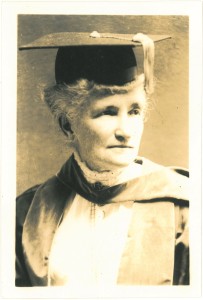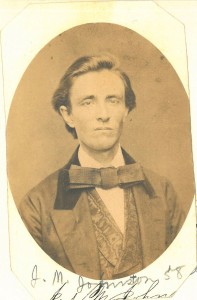“Singular Charm and Superb Character”- The Life of Adelia Antoinette Field Johnston
Project Group: Taylor Swift, Emma Hahn, and Maggie Gossiaux
Student Editor: Rebecca Debus

Introduction:
Adelia Antoinette Field was born in Lafayette, Ohio, on 5 February 1837, to parents Leonard Field (1809-1849) and Margaret Gridley Field (1813-1887).1 Her father instilled a passion for education within her early on, and was personally responsible for many of her earliest lessons.2 After his death in 1849, Adelia and her mother settled in Oberlin, Ohio. Adelia Field attended Oberlin College, graduating from the Ladies’ Course in 1856.3 She then began a career as a teacher that would last for the rest of her life. She married a fellow Oberlin graduate, James M. Johnston, and the two lived quite happily together until his death in 1861.4 Adelia Johnston never remarried and remained childless throughout her life.

Source: Former Student File: James Mix Johnston. Record Group 28/2, Box 539. Oberlin College Archives.
In 1870, she became Principal of the Women’s Department at Oberlin College and began teaching there as well; during her tenure, the position was renamed “Dean of Women.”5 A year after she became Principal, she was the first woman to become an official member of the Oberlin faculty. In 1890, Johnston was granted the title of Professor of Medieval History, becoming the first female professor at Oberlin, and possibly the first female professor at a coeducational university in the United States.6
Throughout her tenure at Oberlin, she was beloved by her students and well-known as a magnificent lecturer. She constantly traveled and these travels formed the basis of many of her most memorable lessons and lectures. In addition to her contributions to Oberlin College as a teacher, Professor Johnston undertook fundraising efforts as Dean of Women that allowed for one of the greatest periods of building and expansion in the history of Oberlin College.
After retiring in 1907, Johnston focused more on the town of Oberlin, and was responsible for many city beautification projects undertaken by the Oberlin Village Improvement Society.7 She also offered lectures to inhabitants of the town and was an active participant in local church activities.
Johnston died on 22 July 1910 after suffering from a series of health problems including cancer and cerebral hemorrhages.8 The legacy she left behind is an important one. She helped shape the college, the town and the lives of countless students for over thirty years.
As the following documents show, Johnston’s many accomplishments were almost entirely due to her own skills and dedication. She expanded the role of women educators at Oberlin and heightened the respect given to female students. Her advocacy for women’s education was not confined to Oberlin, and she fought fiercely to ensure that women had the right to the same education as men. Like many early feminists, including Mary Wollstonecraft and Margaret Fuller, Johnston believed that education was necessary for improving the condition of women. Unlike many other feminists of her day, however, Johnston was not a suffragist.9 Despite the fact that she did not openly advocate for women’s political rights, Johnston’s very existence challenged many of the barriers women faced in attaining social and economic equality. She also sought to reform the world around her in other ways. Like women such as France Willard and fellow Oberlin graduate Lucy Stone, was a powerful advocate for both temperance and abolition.10 Her civic engagement also calls to mind the efforts of other prominent nineteenth-century women such as Jane Addams, founder of Hull House in Chicago.
Johnston’s efforts to push the boundaries of what women could accomplish aided both her gender as a whole and the town of Oberlin in particular. However, the barriers she faced reveal the ways in which nineteenth-century society still sought to limit women. The limits of her own engagement with women’s rights illustrate just how often women themselves were ambivalent about their changing role in society. Adelia Field Johnston was a remarkable individual in the history of Oberlin and the reforms she made with the college should be both applauded and remembered. However, it must also be remembered that her remarkable success remained beyond the reach of many women. Though Johnston in her own way advocated for those women, she still serves as a reminder of the limits of individuals to enact true societal reform.
1Oberlin College Archives. “Adelia A. Field Johnston Papers Finding Guide.” web address, accessed 15 July 2015.
2Harriet Louise Keeler. The Life of Adelia A. Field Johnston Who Served Oberlin College for Thirty-Seven Years … Britton Printing Company, 1912. Memorial Record of the County of Cuyahoga and City of Cleveland, Ohio. Genealogical Committee, Western Reserve Historical Society, 1894.
3Oberlin College Archives. “Adelia A. Field Johnston Papers Finding Guide.” web address, accessed 15 July 2015.
4Oberlin College Archives. “Adelia A. Field Johnston Papers Finding Guide.” web address, accessed 15 July 2015.
5Harriet Louise Keeler. The Life of Adelia A. Field Johnston.
6Former Student File, Johnston, Adelia A.F. Box 539. Oberlin College Archives.
7 Oberlin College Archives. “Adelia A. Field Johnston Papers Finding Guide.” web address, accessed 15 July 2015; Harriet Louise Keeler. The Life of Adelia A. Field Johnston.
8Oberlin College Archives. “Adelia A. Field Johnston Papers Finding Guide.” web address, accessed 15 July 2015. Keeler, Harriet Louise. The Life of Adelia A. Field Johnston.
9Harriet Louise Keeler. The Life of Adelia A. Field Johnston.
10Harriet Louise Keeler. The Life of Adelia A. Field Johnston.